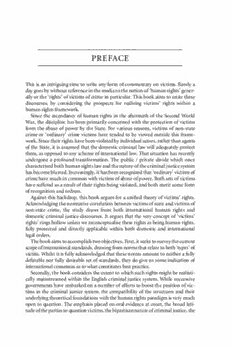
Victims’ Rights, Human Rights and Criminal Justice: Reconceiving the Role of Third Parties PDF
329 Pages·2008·1.401 MB·English
Most books are stored in the elastic cloud where traffic is expensive. For this reason, we have a limit on daily download.
Preview Victims’ Rights, Human Rights and Criminal Justice: Reconceiving the Role of Third Parties
Description:
In recent times, the idea of ‘victims’ rights’ has come to feature prominently in political, criminological and legal discourse, as well as being subject to regular media comment. The concept nevertheless remains inherently elusive, and there is still considerable ambiguity as to the origin and substance of such rights. This monograph deconstructs the nature and scope of the rights of victims of crime against the backdrop of an emerging international consensus on how victims ought to be treated and the role they ought to play. The essence of such rights is ascertained not only by surveying the plethora of international standards which deal specifically with crime victims, but also by considering the potential cross-applicability of standards relating to victims of abuse of power, with whom they have much in common. In this book Jonathan Doak considers the parameters of a number of key rights which international standards suggest victims ought to be entitled to. He then proceeds to ask whether victims are able to rely upon such rights within a domestic criminal justice system characterised by structures, processes and values which are inherently exclusionary, adversarial and punitive in nature.
See more
The list of books you might like
Most books are stored in the elastic cloud where traffic is expensive. For this reason, we have a limit on daily download.
